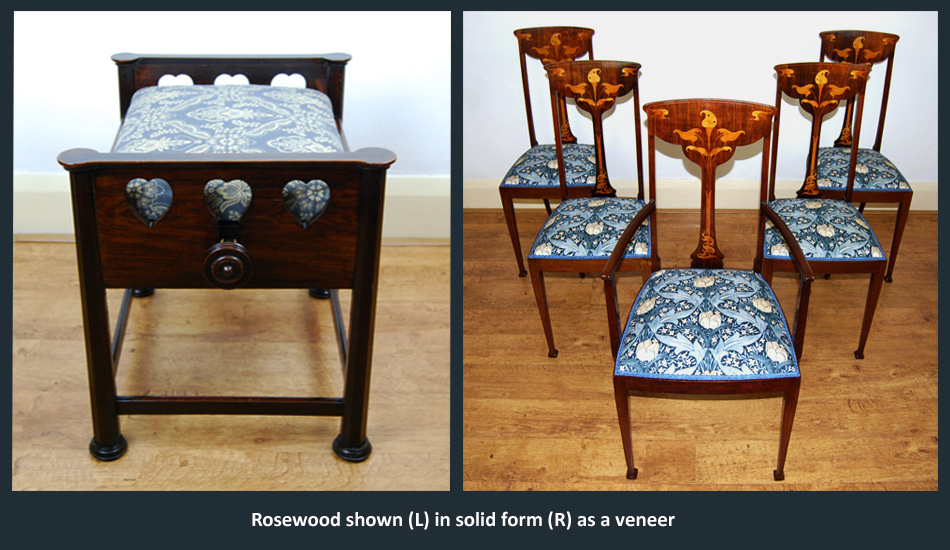
Sustainability & Antique Chairs
Making environmentally-aware lifestyle and green purchasing choices is nowadays very important in our daily lives. This is more so when faced with present growing challenges, such as biodiversity loss, ecosystem degradation, climate change and environmental pollution. read more.....
Antique chairs with rosewood
Protecting the environment also requires the regulation of the trade in species, especially when endangered, in order to safeguard their long-term survival in the wild. In this regard, the Convention on International Trade in Endangered Species of Wild Flora and Fauna (CITES) sets out legal restrictions that directly affect the antique furniture sector, in terms of antique items that contain elements of endangered species.
Ivory inlay in chairs
Another important environmental legislation affecting the sale and buying of antique chairs is the ivory ban. Ivory may sometimes be found as an inlay in chairs. The Ivory Act 2018 (came into effect in June 2022) bans the sale of any form of ivory, unless the ivory falls within certain exemption categories. An exemption must be applied in order to deal in items containing ivory (including buying and selling). read more.....
CITES & Rosewood in Antique Seating Furniture
Rosewood, with its unique black wavy graining/streaking and rich reddish-brown colour variations, was very much prized by past cabinet makers as an exotic and expensive timber. It is very much seen in high quality antique seating furniture in the form of solid timber (practised from the early 19th c.) or as decorative inlays and veneers (practised from the late 18th c).
Nowadays however rosewood timber species (e.g. Dalbergia spp. and Guibourtia spp.) have become severely overexploited and hence endangered. CITES has therefore set legal requirements to regulate the trade of all rosewood timber species listed in their appendices.
Rules on the commercial use of endangered species applies to the keeping and offering for sale of rosewood furniture made post 1947 e.g. mid-century modern furniture. Such sale requires a CITES commercial use certificate (also known as an Article 10 certificate and a Transaction Species Certificate) to be issued by DEFRA's Animal and Plant Health Agency (APHA) and can only be used for one transaction by the applicant.
Chairs containing rosewood timber (whether in solid form or as inlay banding) and sold by The Sitting Place® all fall within the special exemption "a specimen (in this case rosewood) within a worked item or finished product (in this case the chair) that is acquired in its finished state before 3 March 1947". Hence, antique rosewood chairs dating from the 1800s to the early 1900s offered for sale by The Sitting Place® are exempt and do not require such a certificate. We do not trade in furniture made post 1947.
The Sitting Place® only sells items of antique seating within Great Britain (mainland) and does not ship overseas. Only local furniture couriers are used and delivery is only to addresses within the mainland. If a buyer however intends to eventually move out of Great Britain an antique rosewood chair initially purchased from The Sitting Place®, they would still require a CITES permit (import, export, re-export) issued by the Animal and Plant Health Agency (APHA) and a corresponding permit from the relevant management authority of the destination country. This would need to be done by the buyer before arranging export out of Great Britain via a shipping company.
There is also a "10kg per shipment" rule that applies specifically to the CITES listed rosewood species (but with exclusions). This exemption refers to the CITES permit no longer being required in the case of finished products to a maximum weight of the listed species of up to 10 kg per shipment. If this weight limit is exceeded, then a permit is still required.

Copyright © 2026 The Sitting Place®. All Rights Reserved.


